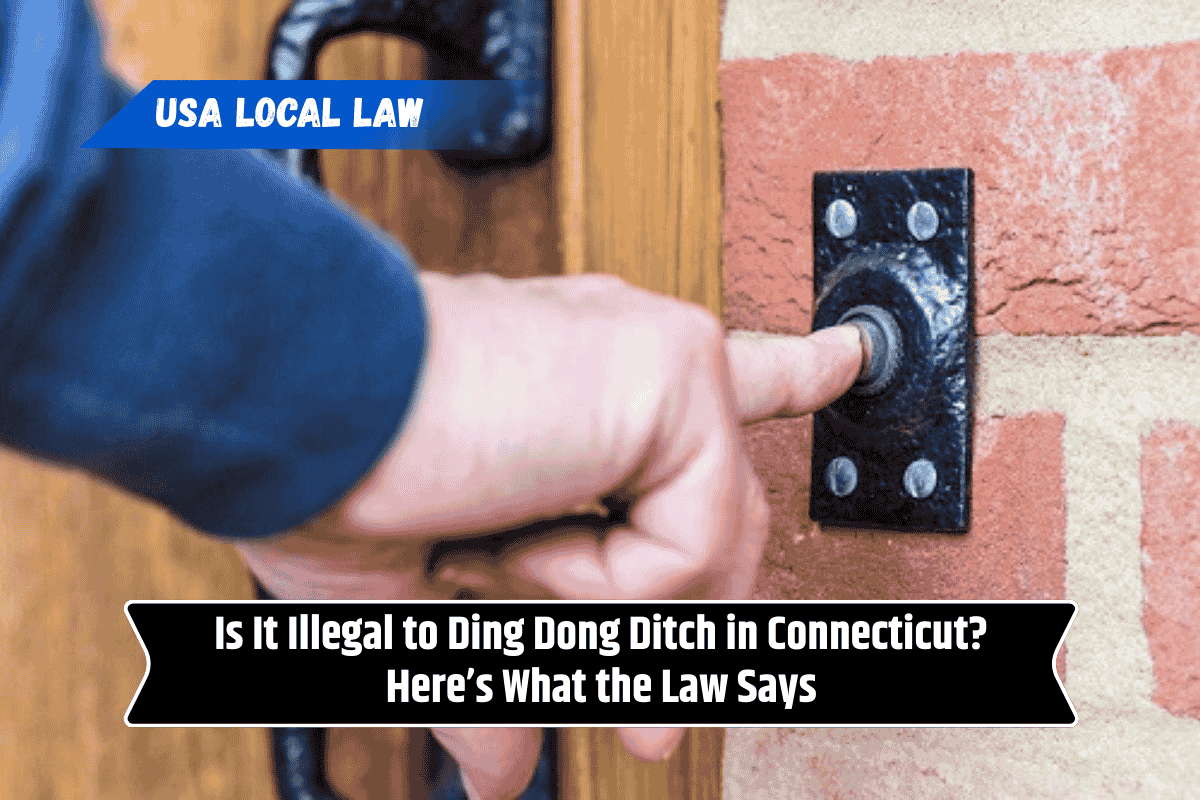Ding dong ditch—ringing someone’s doorbell and then running away before they answer—might seem like a harmless prank. But if you’re in Connecticut, you could be surprised to learn that this so-called “innocent fun” could actually land you in legal trouble.
Whether you’re a teen pulling a joke or a parent wondering if your kid is crossing the line, here’s what the law says in simple terms.
What Exactly Is Ding Dong Ditch?
Ding dong ditch is a prank where someone:
Rings or knocks at a door
Quickly runs away before the homeowner answers
Often repeats the act to annoy or confuse the resident
While it may not seem serious, the intent and outcome of the prank are what really matter under the law.
Is Ding Dong Ditch Illegal in Connecticut?
There’s no specific law in Connecticut that uses the phrase “ding dong ditch”, but the act can still break several laws, depending on how it’s done and how it’s perceived. It may be considered:
Disorderly conduct
Trespassing
Harassment
Disturbing the peace
Let’s break these down.
1. Disorderly Conduct (CGS § 53a-182)
Under Connecticut law, disorderly conduct includes any action that intends to cause inconvenience, annoyance, or alarm to others. Ringing someone’s doorbell repeatedly just to mess with them fits this definition.
Penalties:
Can be charged as a Class C misdemeanor
May result in fines up to $500 or jail time up to 3 months
2. Criminal Trespass (CGS § 53a-109 to 53a-110a)
Even if you’re just stepping onto someone’s front porch to ring the bell, if you were told not to return or if signs are posted (like “No Trespassing”), you could be charged with criminal trespass.
Penalties depend on the degree:
Third-degree trespass is a Class C misdemeanor
Can lead to fines and possible jail time
3. Harassment or Stalking (in Repeated Cases)
If you or someone else keeps returning to the same house and scaring or disturbing the residents, it might rise to the level of harassment or even stalking, especially if the resident feels threatened.
This becomes a much more serious offence and can result in:
Restraining orders
Criminal charges
Juvenile court involvement for minors
4. Disturbing the Peace or Creating a Nuisance
Even if not directly charged under the above laws, local authorities may still act if the prank:
Wakes up residents at night
Involves yelling or property damage
Causes community complaints
You might be let off with a warning, but repeat incidents could lead to formal charges, especially in neighbourhoods with active security cameras.
Can Kids or Teens Get in Trouble?
Yes. While kids under 18 are usually handled in juvenile court, they can still:
Be charged with misdemeanors
Face community service, counseling, or probation
Be required to apologise or compensate if any damage was done
Parents can also be held partially responsible, especially if property damage or harassment claims are involved.
What Should You Do If Someone Ding Dong Ditches You?
If someone pulls the prank on you, here’s what you can do:
Stay calm—avoid escalating the situation
Check security cameras, if available
Call the police if it becomes frequent or feels threatening
Report it to local authorities if you suspect it’s harassment
You can also post clear “No Trespassing” signs to strengthen your legal position.
In Connecticut, ding dong ditch may seem like an innocent prank, but under the law, it can easily cross into criminal behaviour—especially if it disturbs the peace, frightens residents, or involves trespassing.
Whether you’re a prankster or a homeowner, knowing the law helps avoid unnecessary trouble. Fun should never come at the cost of someone else’s safety or peace of mind.
